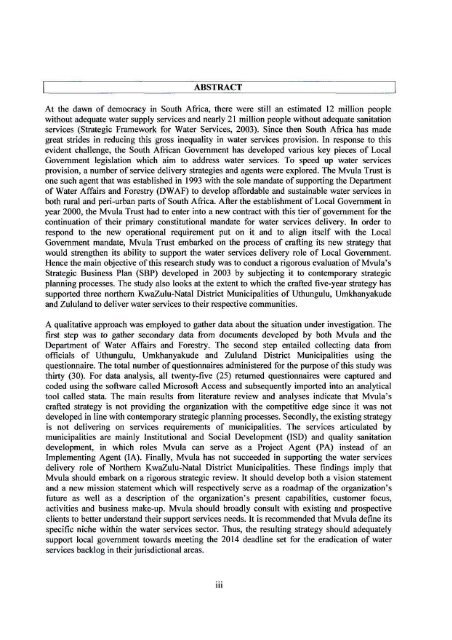Buthelezi_Mbongiseni_ William_2006.pdf
Buthelezi_Mbongiseni_ William_2006.pdf
Buthelezi_Mbongiseni_ William_2006.pdf
Create successful ePaper yourself
Turn your PDF publications into a flip-book with our unique Google optimized e-Paper software.
ABSTRACT<br />
At the dawn of democracy in South Africa, there were still an estimated 12 million people<br />
without adequate water supply services and nearly 21 million people without adequate sanitation<br />
services (Strategic Framework for Water Services, 2003). Since then South Africa has made<br />
great strides in reducing this gross inequality in water services provision. In response to this<br />
evident challenge, the South African Government has developed various key pieces of Local<br />
Government legislation which aim to address water services. To speed up water services<br />
provision, a number of service delivery strategies and agents were explored. The Mvula Trust is<br />
one such agent that was established in 1993 with the sole mandate of supporting the Department<br />
of Water Affairs and Forestry (DWAF) to develop affordable and sustainable water services in<br />
both rural and peri-urban parts of South Africa. After the establishment of Local Government in<br />
year 2000, the Mvula Trust had to enter into a new contract with this tier of government for the<br />
continuation of their primary constitutional mandate for water services delivery. In order to<br />
respond to the new operational requirement put on it and to align itself with the Local<br />
Government mandate, Mvula Trust embarked on the process of crafting its new strategy that<br />
would strengthen its ability to support the water services delivery role of Local Government.<br />
Hence the main objective of this research study was to conduct a rigorous evaluation of Mvula's<br />
Strategic Business Plan (SBP) developed in 2003 by subjecting it to contemporary strategic<br />
planning processes. The study also looks at the extent to which the crafted five-year strategy has<br />
supported three northern KwaZulu-Natal District Municipalities of Uthungulu, Umkhanyakude<br />
and Zululand to deliver water services to their respective communities.<br />
A qualitative approach was employed to gather data about the situation under investigation. The<br />
first step was to gather secondary data from documents developed by both Mvula and the<br />
Department of Water Affairs and Forestry. The second step entailed collecting data from<br />
officials of Uthungulu, Umkhanyakude and Zululand District Municipalities using the<br />
questionnaire. The total number of questionnaires administered for the purpose of this study was<br />
thirty (30). For data analysis, all twenty-five (25) returned questionnaires were captured and<br />
coded using the software called Microsoft Access and subsequently imported into an analytical<br />
tool called stata. The main results from literature review and analyses indicate that Mvula's<br />
crafted strategy is not providing the organization with the competitive edge since it was not<br />
developed in line with contemporary strategic planning processes. Secondly, the existing strategy<br />
is not delivering on services requirements of municipalities. The services articulated by<br />
municipalities are mainly Institutional and Social Development (ISD) and quality sanitation<br />
development, in which roles Mvula can serve as a Project Agent (PA) instead of an<br />
Implementing Agent (IA). Finally, Mvula has not succeeded in supporting the water services<br />
delivery role of Northern KwaZulu-Natal District Municipalities. These findings imply that<br />
Mvula should embark on a rigorous strategic review. It should develop both a vision statement<br />
and a new mission statement which will respectively serve as a roadmap of the organization's<br />
future as well as a description of the organization's present capabilities, customer focus,<br />
activities and business make-up. Mvula should broadly consult with existing and prospective<br />
clients to better understand their support services needs. It is recommended that Mvula define its<br />
specific niche within the water services sector. Thus, the resulting strategy should adequately<br />
support local government towards meeting the 2014 deadline set for the eradication of water<br />
services backlog in their jurisdictional areas.<br />
iii
















